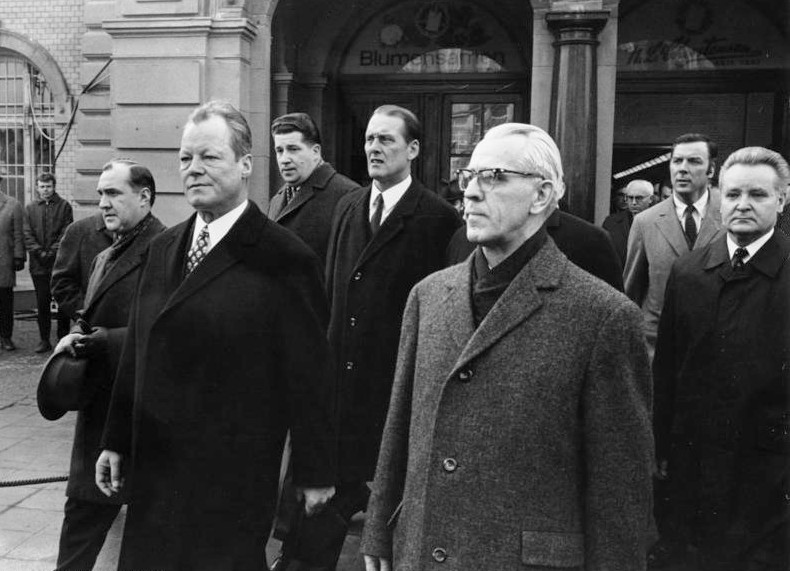
Ostpolitik
Neue Ostpolitik (German for "new eastern policy"), or Ostpolitik (German: [ˈɔstpoliˌtiːk] ⓘ) for short, was the normalization of relations between the Federal Republic of Germany (FRG, or West Germany) and Eastern Europe, particularly the German Democratic Republic (GDR, or East Germany) beginning in 1969. Influenced by Egon Bahr, who proposed "change through rapprochement" in a 1963 speech at the Evangelische Akademie Tutzing, the policies were implemented beginning with Willy Brandt, fourth Chancellor of the FRG from 1969 to 1974,[1] and winner of the 1971 Nobel Prize for Peace for his efforts to place this policy at the acme of the FRG.[2][3]
For the "Eastern Politics" of Britain, France, Russia, and Austria in the 19th century, see Eastern Question.
Ostpolitik was an effort to break with the policies of the Christian Democratic Union (CDU), which was the elected government of West Germany from 1949 until 1969. The Christian Democrats under Konrad Adenauer and his successors tried to combat the Communist government of East Germany, while Brandt's Social Democrats tried to achieve a certain degree of cooperation with East Germany.
The term Ostpolitik has since been applied to Pope Paul VI's efforts to engage Eastern European countries during the same period. The term Nordpolitik was also coined to describe similar rapprochement policies between North and South Korea beginning in the 1980s.
Intention[edit]
Following the end of World War II in 1945, Allied-occupied Germany was split into two states: the Federal Republic of Germany (FRG, or West Germany) and the German Democratic Republic (GDR, or East Germany). Initially, both governments claimed that they represented the entire German nation. However, the Federal Republic saw itself as the only German government with democratic legitimacy. Later, at the end of the 1960s, the communist government of the GDR claimed that there was no longer a common German nation as the GDR had established a socialist nation.
The Christian Democratic Union (CDU) political party dominated West German governments from 1949 to 1969. These governments refused to have any contact with the GDR government due to its undemocratic character, and the Hallstein Doctrine stipulated that the FRG would withdraw diplomatic contact from any country that established diplomatic relations with the GDR. The first application of the Hallstein Doctrine was in 1957, when the FRG withdrew recognition of Yugoslavia after it accepted a GDR ambassador. In the 1960s it became obvious that this policy would not work forever. When the Federal Republic established diplomatic relations with Israel in 1965, the Arab states countered by breaking off relations with the Federal Republic and establishing relations with the GDR.
Even before his election as Chancellor, Willy Brandt, the Social Democratic mayor of West Berlin, argued for and pursued policies that would ease tensions between the two German states, generally in the interest of cross-border commerce. His proposed new Ostpolitik held that the Hallstein Doctrine did not help to undermine the communist government or even lighten the situation of the Germans in the GDR. Brandt believed that collaboration with the communists would foster German-German encounters and trade that would undermine the communist government over the long term.
Nonetheless, he stressed that his new Ostpolitik did not neglect the close ties of the Federal Republic with Western Europe and the United States or its membership in NATO. Indeed, by the late 1960s, the unwavering stance of the Hallstein Doctrine was actually considered detrimental to US interests; numerous American advisors and policymakers, most notably Henry Kissinger, urged Bonn to be more flexible. At the same time, other West European countries entered a period of more daring policy directed to the East.[4] When Brandt became Chancellor in 1969, the same politicians now feared a more independent German Ostpolitik, a new "Rapallo". France feared that West Germany would become more powerful after détente; Brandt ultimately resorted to pressuring the French government into endorsing his policy by holding out German financial contributions to the European Common Agricultural Policy.[5]
Policies similar to Ostpolitik[edit]
Pre-WW2 diplomacy[edit]
German states (Prussia and Saxony as well as unified Germany) have long faced the issues of co-existing with their eastern neighbours, whatever the differences in culture, beliefs and outlook.
Bismarck's complex foreign-policy balances included the 1887 Reinsurance Treaty with the German Empire's eastern neighbour, the Russian Empire.
Weimar Germany broke out of a degree of diplomatic isolation by signing the Treaty of Rapallo with Soviet Russia in 1922.
The Molotov–Ribbentrop Pact of 1939 defied ideological differences and established trade and geopolitical agreements between Nazi Germany and the Soviet Union.
Vatican diplomacy[edit]
Ostpolitik is also the name given to the policies of Pope Paul VI (in office: 1963-1978) towards the Soviet Union and its Eastern European satellite states. Trying to improve the condition of Christians in general and Catholics in particular behind the Iron Curtain, he engaged in dialogue with Communist authorities at several levels, receiving Foreign Minister Andrei Gromyko and USSR head of state Nikolai Podgorny in 1966 and 1967 in the Vatican. The situation of the Church in Poland, Hungary and Romania improved somewhat during his pontificate.[9]
South Korea[edit]
South Korea's 1980s policy of Nordpolitik was named in allusion to Ostpolitik.
A similar concept is Sunshine Policy, which is the main North Korea policies of the Democratic Party of Korea.
These are West German treaties that have Ostpolitik as a primary or secondary policy goal:
Later agreements in the period of Christian Democrat Helmut Kohl (from 1982 through German reunification in 1990), although dealing with similar issues and having similar goals, are not considered to be Ostpolitik.